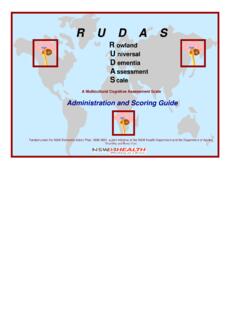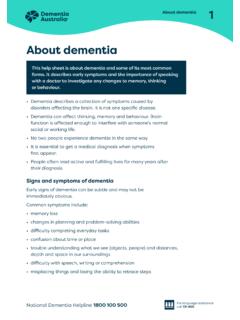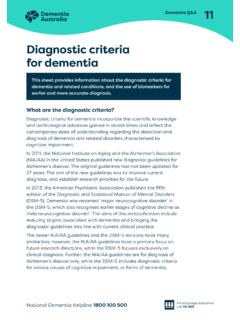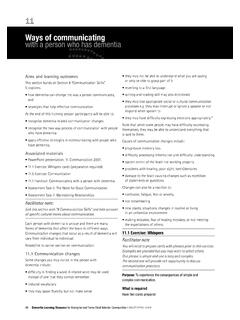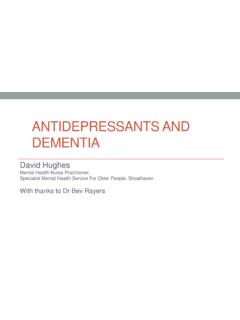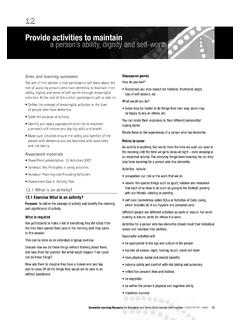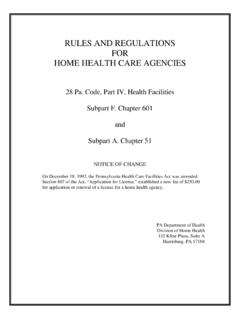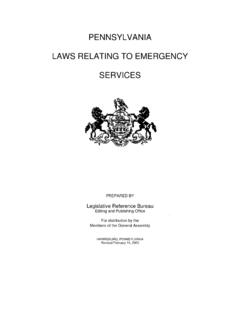Transcription of DEMENTIA AND YOUR LEGAL RIGHTS
1 DEMENTIA AND YOUR LEGAL RIGHTSA PRACTICAL GUIDE TO HELP PEOPLE DIAGNOSED WITH DEMENTIA , THEIR FAMILIES AND CARERS, TO BETTER UNDERSTAND THE LEGAL ISSUES THEY MAY BE FACED WITH, THEIR LEGAL RIGHTS AND THE ACTIONS THEY CAN TAKE TO PROTECT THEIR Ms Sue Field and Professor Colleen CartwrightACKNOWLEDGEMENTSA lzheimer s Australia would like to acknowledge the support of our National Consumer Advisory Committee and our Alzheimer s Australia DEMENTIA Advisory Committee and thank them for their invaluable support in developing and reviewing this thanks to the authors.
2 Adjunct Fellow in Elder Law, Ms Sue Field and Professor Colleen Cartwright who developed this resource on behalf of Alzheimer s s Australia respectfully acknowledges Aboriginal and Torres Strait Islander people as Traditional Custodians of their land, we also acknowledge both past and present Elders, and their continuing connection to and Your LEGAL Rights1 CONTENTSI ntroduction31. Mental capacity and decision-making4 What does capacity to make decisions really mean?4If I no longer have capacity can I still be involved in decision making?
3 4 Who decides when I no longer have capacity to make my own decisions?4 Can I appoint someone to make decisions for me when I am no longer able to make my own?5 Table 1 Substitute decision-makers according to State or Territory6 What kinds of decisions can the substitute decision-maker make on my behalf?6 Who has the LEGAL right to make decisions for me if I have not appointed someone?7 What is the difference between supported decision-making and substitute decision-making?7 Table 2 Names of State/Territory Boards/Tribunals82.
4 Your LEGAL RIGHTS and decision-making with regard to your finances10 Should I consider appointing someone to manage my finances?10 How should I choose an Attorney for financial matters?10 How can I be sure the Attorney will act in my best interests?10 Can I change my Power of Attorney arrangements?113. Your LEGAL RIGHTS and decision-making in regard to health care and personal decisions12 Should I consider appointing someone to make personal and health care decisions on my behalf?12 How should I choose an Enduring Guardian?
5 12 Who has the LEGAL right to make health care decisions for me if I have not appointed someone?12 Who will be responsible for making decisions for me if I live alone?13 What is an advance Care Directive and is this something I should consider?13 Table 3 advance health decision-making instruments by State/Territory14Do I have the right to consent to, or refuse, medical treatment?14 Table 4 List of agencies that receive health care complaints15Is my GP or specialist obliged to tell me that I have DEMENTIA ?
6 15 What are my RIGHTS in relation to physical or chemical restraint in my home, or in a residential aged care facility?164. Your LEGAL RIGHTS and responsibilities in relation other matters17 Employment17 Superannuation18 Criminal Responsibility19 Voting19 Driving19 Travel20 Wills21 Conclusion22 Further Resources232 ALZHEIMER S AUSTRALIA DEMENTIA and Your LEGAL Rights3 INTRODUCTIONThis booklet has been written to help people diagnosed with DEMENTIA , their families and carers to better understand the LEGAL issues they may be faced with.
7 Their LEGAL RIGHTS and the actions they can take to protect their issues covered in this booklet include:1. What mental capacity means, and how it applies to Your LEGAL RIGHTS and decision-making with regard to your Your LEGAL RIGHTS and decision-making with regard to your health care and personal Your LEGAL RIGHTS and responsibilities in relation to other matters including employment; superannuation; criminal responsibility; voting, driving; travel; and your the person diagnosed with DEMENTIA , the information in this booklet may include issues that you have not previously considered or discussed with others.
8 This may seem like a lot of information to digest, and it may be helpful to review this document in sections over a period of time. It is important for you to discuss your views and wishes with your family and friends, and finalise relevant documents while you are still legally capable of doing so. There are services available to support you through this process, if you need them. Your circumstances are unique to yourself, and the information provided in this booklet is of a general nature only. Please seek LEGAL advice if you feel you need is important to remember at the outset that Australia has a federal system of government, therefore some areas of law are governed by Federal laws, and others are governed by State or Territory laws.
9 These differences will become apparent throughout the booklet. The important thing is to be clear on what the law is in your State/Territory, and how it is S AUSTRALIA 1. MENTAL CAPACITY AND DECISION-MAKINGWhat does capacity to make decisions really mean?For the person diagnosed with DEMENTIA , a very important thing to consider is what might happen at the point where you no longer have the capacity to make your own legislation across Australia is based on the international principle of presumption of capacity.
10 This means that you are assumed to have capacity to make your own decisions unless someone can prove that you do not. Just having a family member or non-professional person claiming that you do not have capacity, is not enough for you to be prevented from making your own decisions. Capacity is decision-specific so even if you have been diagnosed with DEMENTIA , you may still have capacity to make all or at least some of your own decisions, especially if you have been diagnosed with early DEMENTIA . Decision-making capacity may fluctuate over time and depend on the context such as the time of day, location, noise, stress or anxiety levels, medication, or Australia, the legislation regarding a person s capacity to make their own decisions differs in each State/Territory.


